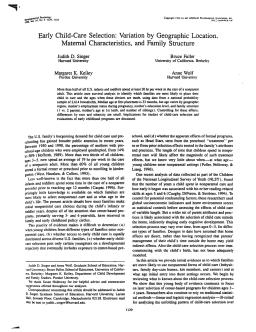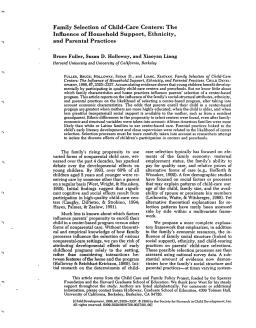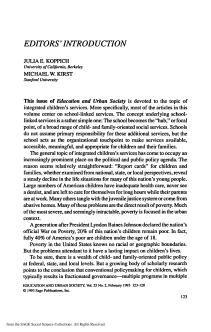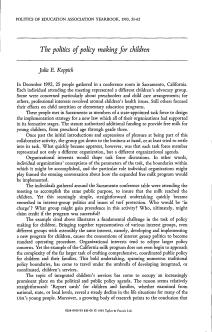Variation by Geographic Location, Maternal Characteristics, and Family Structure
Published
Summary
This article uses survival analysis to examine factors associated with placing infants and toddlers in nonparental care, and at what ages. Using data from a national probability sample of 2,614 households, the study finds that the median age at first placement is 33 months and varies by geographic region, mother's employment status during pregnancy, education level, and family structure. Differences by race and ethnicity are small. The article discusses implications for studies of childcare selection and evaluations of early childhood programs.
The Influence of Household Support, Ethnicity, and Parental Practices
Published
Summary
An investigation of the family factors and practices that influence parents' choice of center-based programs for young children. Maternal education, child's age, and availability of social support were found to be significant factors in center selection. African-American families were more likely to choose center-based care than white or Latino families, and parental practices related to early literacy development and close supervision also affected center selection. The study highlights the importance of considering selection processes when assessing the effects of early childhood programs.
Editors' Introduction
Published
Summary
The concept of school-linked services is to make social services available to children and families through the school acting as an organizational touchpoint. This idea has become increasingly prominent due to the declining life situations of many American children, particularly those in urban areas, who face poverty-related issues like inadequate healthcare, juvenile justice involvement, and abusive homes.
Published
Summary
The politics of policy making for children is complex due to the multiple interest groups involved. Fragmented policies exacerbate the problem of declining life situations for children. A comprehensive children's policy is needed, but traditional interest-group approaches to policy development must shift to integrate services for children. California's politics of children's policy is briefly explored. The current political paradigm must fundamentally change to open policy doors for broad-based integrated services for children.
Published
Summary
School finance has become a prominent issue again due to court decisions and litigation in several states. This article explores school finance changes in the 70s and 80s and outlines key issues for the 90s, including the relationship between finance and education goals, site-based management, teacher pay, accountability, school choice, and nontraditional issues such as preschool and non-educational services for children.
Overcoming Barriers, Creating New Opportunities
Published
Summary
This article highlights the changing nature of childhood, with increasing physical and mental health problems, substance abuse, child abuse, inadequate child care, and family disorganization. Furthermore, schools struggle to meet the needs of non-middle-class, nonwhite, non-English-speaking children, as more students from these backgrounds enter public schools. To improve educational prospects, school leaders must recognize how children's daily lives affect their education and adapt to these changes.





